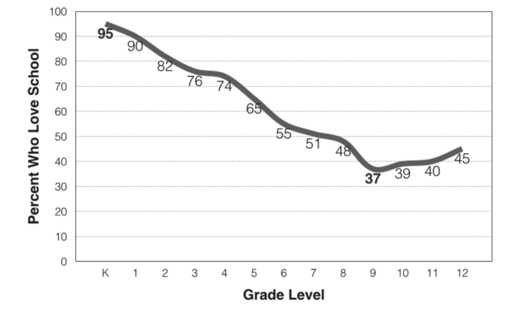We recently hosted an evening event with parents and teachers entitled, “The Future of Education.” The workshop was more of a discussion about the factors that are currently disrupting and redefining education rather than an articulation of what education will look like in the future.
To begin the discussion, each participant was asked to describe the most effective learning experience in his or her life. While there was a wide range of responses, there was one common theme: All but one of the learning experiences occurred outside of a K-12 school setting. The one parent whose experience took place in school shared that his Grade 2 teacher allowed him to extend his learning in an area of personal interest that developed well beyond the level required in the syllabus.
The participants were then asked to explain why they believed the learning experiences they described were so effective and meaningful. What emerged from the ensuing discussion was the concept of relevance – when the learning represented a high level of relevance to the learner, the result was usually an effective and deeply meaningful learning experience.
Relevance
So, is the concept of relevance as a basis for our educational programs the panacea we have been seeking to significantly improve K-12 educational programs and, in turn, student learning and development? While we know there is no simple “one solution fits all” solution to improving schools, we are seeing an increased focus on relevance and personalized learning. If forced to use one word to describe the future of education, many would agree that the word would be relevance.
The research of Lee Jenkins (2013) highlights why this discussion is important. Jenkins worked with 3,000 teachers from Kindergarten to Grade 12 to determine how enthusiastic students are about school. The result of the study was that 95% of kindergarten students are enthusiastic about school. However, this percentage drops significant each year until Grade 9 when the percentage of students enthusiastic about school drops to a low of 37%. The small increase between Grades 10 to 12 is attributed to the focus of some students on graduation and beyond (see graph below). It seems that we should all be concerned with the results of this study.
 Source: The New Meaning of Educational Change, Fifth Edition, by Michael Fullan
Source: The New Meaning of Educational Change, Fifth Edition, by Michael Fullan
It is believed that a greater focus on relevance in education will contribute to ensuring a higher level of student enthusiasm for school. To that end, relevance can be defined in many ways, including the framework of preparing students for life beyond school.
Future of Jobs
In Future of Jobs, published by the World Economic Forum, the report lists the top ten skills needed to thrive in a 2015 work environment. Looking ahead five years, it is believed that over 35% of the skills considered important for work today will have changed, resulting in a different list of top ten skills in 2020.
Top 10 Skills in 2015:
- Complex Problem Solving
- Coordinating with Others
- People Management
- Critical Thinking
- Negotiation
- Quality Control
- Service Orientation
- Judgment and Decision Making
- Active Listening
- Creativity
Top 10 Skills in 2020:
- Complete Problem Solving
- Critical Thinking
- Creativity
- People Management
- Coordinating with Others
- Emotional Intelligence
- Judgment and Decision Making
- Service Orientation
- Negotiation
- Cognitive Flexibility
In comparing the two tables, it is interesting to note that five of the skills in 2020 are relationship based: People Management, Coordinating with Others, Emotional Intelligence, Service Orientation, and Negotiation. It is also interesting to note that Creativity moved up the list from tenth place in 2015 to third place in 2020.
Creativity
George Land was responsible for developing a creativity test for NASA to determine how innovative potential scientists and astronauts were as part of the candidate assessment process. In 1968, Land used the same test to evaluate children over a ten-year period. The results were astonishing, as displayed in the chart below.
 Source: Most Likely to Succeed: Preparing our Kids for the Innovation Era, by Tony Wagner and Ted Dintersmith
Source: Most Likely to Succeed: Preparing our Kids for the Innovation Era, by Tony Wagner and Ted Dintersmith
The test was given to 1,600 students with a resulting score of 98% for five-year-olds. The same students were tested five and ten years later, scoring 30% and 12% respectively. The same test was given to 280,000 adults, who scored an average of 2%. The conclusion of the study was that non-creative behavior is learned.
The significant drop in levels of creativity has been attributed, in large part, to, an educational system that was developed on a premise established 200 years ago during the Industrial Revolution to train students to follow instructions and be good workers. Education has of course evolved since that time, though it can be argued that the framework associated with the original premise continues to limit reform in education.
Returning to the title of this post and the Future of Education, some of the questions that will guide future educational reforms will need to include issues relating to creativity, future work skills, enthusiasm for school, and, perhaps most importantly, the concept of relevance and the learning process.
O Futuro da Educação
Recentemente nós promovemos um evento para pais e professores chamado “ O Futuro da Educação”. O workshop foi mais uma discussão sobre os fatores que atualmente estão perturbando e redefinindo a educação do que uma articulação sobre o que a educação virá a ser no futuro.
Ao começarmos a discussão, pedimos que cada participante descrevesse a experiência de aprendizado mais eficaz em sua vida. Em meio uma variedade de respostas, notamos um tema em comum: Todas as experiências, exceto uma, aconteceram fora do ambiente escolar. O pai que contou sobre a sua experiência na escola disse que a sua professora do segundo ano permitiu que ele estendesse sua aprendizagem em uma área de interesse pessoal que se desenvolveu muito além do nível exigido pelo programa.
Em seguida, pedimos aos participantes que explicassem por que eles acreditavam que suas experiências de aprendizado compartilhadas ali foram tão eficazes e significativas. O que emergiu do debate que se seguiu foi o conceito de relevância – em que o aprendizado representou um alto nível de importância para o aluno e o resultado foi uma experiência de aprendizado efetiva, profunda e significativa.
Relevância
Sendo assim, será que o conceito de relevância como base para nossos programas educacionais é a panaceia que temos buscado para melhorar significativamente os programas educacionais K-12 e, por sua vez, o aprendizado do aluno e seu desenvolvimento?
Apesar de sabermos que não há uma simples “solução para todos” para a melhoria das escolas, estamos vendo que existe um foco maior na relevância e aprendizagem personalizada. Se nos esforçarmos para achar uma palavra que descreva o futuro da educação, muitos irão concordar que a palavra seria relevância.
A pesquisa de Lee Jenkins (2013) destaca por que esta discussão é importante. Jenkins trabalhou com 3.000 professores do jardim de infância ao 12º ano para determinar como alunos entusiasmados se sentem sobre a escola. O estudo mostrou que 95% dos alunos do jardim de infância estão entusiasmados com a escola. No entanto, esse percentual cai de forma significativa a cada ano, até a 9ª série, quando a percentagem de alunos entusiasmados com a escola cai para 37%. O pequeno aumento entre os 10º e 12º anos é atribuído ao foco de alguns alunos na graduação, entre outros (ver gráfico abaixo). Parece que todos nós devemos nos preocupar com os resultados deste estudo.
Fonte: The New Meaning of Educational Change, Fifth Edition, by Michael Fullan
Acredita-se que um foco maior na relevância em educação contribuirá para assegurar um maior nível de alunos entusiasmados com a escola. Para isso, a relevância pode ser definida de várias maneiras, incluindo a abordagem de preparar alunos para a vida além da escola.
O Futuro dos Empregos
O artigo “O Futuro dos Empregos”, publicado pelo Fórum Econômico Mundial, lista as dez principais habilidades necessárias para prosperar em um ambiente de trabalho de 2015. Olhando cinco anos para frente, acredita-se que mais de 35% das habilidades consideradas hoje importantes para o trabalho, irão mudar resultando em uma lista diferente das dez melhores habilidades em 2020.
As 10 melhores habilidades em 2015:
- Resolução de problemas complexos
- Interação com os outros
- Gestão de Pessoas
- Pensamento Crítico
- Negociação
- Controle de Qualidade
- Orientação de Serviços
- Julgamento e Tomada de Decisão
- Escuta Ativa
- Criatividade
As 20 melhores habilidades em 2020:
- Resolução de Problemas Completa
- Pensamento Crítico
- Criatividade
- Gestão de Pessoas
- Interação com os outros
- Inteligência Emocional
- Julgamento e Tomada de Decisão
- Orientação a Serviços
- Negociação
- Flexibilidade Cognitiva
Na comparação das duas tabelas, é interessante notar que cinco das habilidades para 2020 estão ligadas a relacionamento: Gestão de Pessoas, Interação com os outros, Inteligência Emocional, Orientação a Serviços e Negociação. Também é interessante notar que a criatividade subiu na lista de décimo lugar em 2015, para o terceiro lugar em 2020.
Criatividade
George Terra foi o responsável pelo desenvolvimento de um teste de criatividade para a NASA para determinar o potencial e quão inovadores cientistas e astronautas eram, como parte de um processo seletivo. Em 1968, Terra usou o mesmo teste para avaliar crianças em um período acima de dez anos.
Os resultados foram surpreendentes, conforme mostrado no gráfico abaixo.
 Fonte: Most Likely to Succeed: Preparing our Kids for the Innovation Era, by Tony Wagner and Ted Dintersmith
Fonte: Most Likely to Succeed: Preparing our Kids for the Innovation Era, by Tony Wagner and Ted Dintersmith
O teste foi aplicado a 1.600 alunos com uma pontuação de 98% para crianças de cinco anos. Os mesmos alunos foram testados cinco e dez anos mais tarde, marcando 30% e 12%, respectivamente. O mesmo teste foi dado a 280.000 adultos, que marcaram uma média de 2%. A conclusão do estudo foi que o comportamento não criativo é aprendido.
A queda significativa nos níveis de criatividade tem sido atribuída, em grande parte, a um sistema educacional que foi desenvolvido em uma premissa estabelecida há 200 anos, durante a Revolução Industrial, para ensinar alunos a seguirem as instruções e serem bons trabalhadores. A educação vem, naturalmente, evoluindo desde aquela época, embora se possa argumentar que o quadro associado com a premissa original continua a limitar a reforma na educação.
Voltando ao título deste artigo e ao Futuro da Educação, algumas das questões que irão orientar as futuras reformas educacionais terão de incluir questões relacionadas a criatividade, habilidades de trabalhos futuros, o entusiasmo para a escola, e, talvez a mais importante, o conceito de relevância e o processo de aprendizagem.
Featured image: cc licensed (CC BY-NC-ND 2.0) flickr photo by Nelson de Witt:Child's Play; https://www.flickr.com/photos/mcescobar1/4826861354
